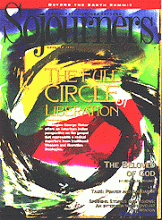To be an ally to a homeless person is very simple: Approach him with an open mind and listen to his story. Don't listen with the idea that's he's a typical Terry the Tramp - listen to him as a person. And don't go to a bureaucrat for answers, ask a homeless person what he needs, and what he can do with your help. - Doug Castle
Doug Castle, a homeless man in Seattle, gets at the heart of Steven VanderStaay's Street Lives: An Oral History of Homeless Americans. VanderStaay, in the tradition of Studs Terkel, Margaret Randall, and others, reminds us that it is the listener as well as the teller who causes the "story" to exist. His active listening and dialogue with a large and diverse cross-section of homeless Americans has allowed him (as listener/interviewer) and the homeless people (as tellers/interviewees) to mutually rewrite history.
A young homeless man in Washington, D.C., Trae Casey, echoes this need for careful listeners: "I've come a long way since I've been here. I've climbed back up. I've pulled myself back up. That's what I'm doing. But it's still hard, man. I need somebody to listen to my problems...Somebody just to take five minutes."
Nearly five years in the writing, this book is the product of VanderStaay listening not just for minutes but for hundreds of hours. And unlike the voiceless "research" on the homeless that masquerades as "objective" analysis (and certainly objectifies the homeless themselves), the voices on these pages empower the homeless to be subjects of their own history. They speak. In so doing they remind us that they have stories worth telling and listening to, that they exist.
Perhaps this seems self-evident. It is not.
Read the Full Article

